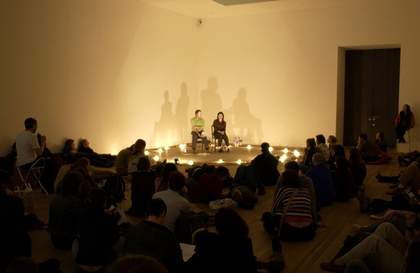
Forced Entertainment
Quizoola! 2003
Performed as part of Tate Culture, Tate Modern, 29 March 2003
Photo © Manuel Vason
Quizoola! by Sheffield-based performance art collective Forced Entertainment was a six-hour improvisation based on the asking and answering of questions. First devised in 2000, the piece was performed at Tate Modern as part of Live Culture, a programme of performance events that took place at the gallery from the 27 to 30 March 2003. Bringing together artists, theorists and curators, Live Culture explored the shifting nature of live art practice in relation to the visual arts and examined the expansion of performance art through a series of live events. In particular, the programme explored the role of performance in relation to cultural change and highlighted the ways in which the term live art encompassed an array of contemporary practices that employed performance as a generative force to play with truth and pretence, and to break apart traditional representational codes.
Based around a script of some 2,000 questions, and taking the form of an absurdist interrogation, Quizoola! consisted of three performers who, in turn, sat in pairs within a circular space in the corner of the gallery. This space was demarcated by a string of bare electric light bulbs, creating a stark bright arena within the relative darkness of the gallery. Working in rotation – and therefore running through each possible combination of players – once inside the circle one performer would ask a series of questions from the script, to which the other would improvise answers. These questions ranged from the serious, ‘How many people died in The Somme?’, to the ridiculous, ‘What is the Queen’s favourite sexual position?’, and from the dry, ‘What is National Insurance?’ to the personal, ‘Do you think other people like you?’. The questions spanned topics including philosophy, politics, history, art, science and ethics. The unscripted, improvised answers in return ranged in content, duration and delivery. Some seemed to be based on fact; others, evidently, complete fiction. Some were long and detailed, and others short and perfunctory. Some were deeply confessional, while others seemed obscure and evasive. Each of the three performers wore smeared clown make-up on their faces, adding to the desperate, comical and sometimes sinister nature of the interrogations.
The fact that audience members were able to come and go as they pleased during the performance emphasised the monotony of the actors’ task and increased the sense of their confinement – trapped as they were in the corner of the gallery space and in the rotation of questioning for the entire six hours. Forced to repeat and react to questions on the spot, with neither preparation nor practice, as Quizoola! progressed, the fatigue induced by the prolonged improvisation influenced how the members of Forced Entertainment interacted and communicated. Talking about the durational aspect of their works the collective said:
After three hours your tongue is loose, the connections in your brain are scrambled. Fatigue has set in and that’s been followed by hysteria. You find yourself doing things you did not expect, making unplanned moves, speaking or moving without thinking ahead … Whilst losing some things – your tricks, your ability or interest in defending yourself – you’re also gaining something else – a sensitivity and concentration in the actual moment. You are, by this time, so very close simply to being and doing.1
In this work, like many other performances by the group, duration was the content and form of the performance. As the performers were forced to draw on ever more subjective philosophies and stories in order to answer the myriad questions put to them, Quizoola! explored the human desire to obtain certainty, definition and truth through language and it exposed the impossibility of this quest. Growing ever more drained of energy, the performers revealed the fallibility of human perception, opinion and knowledge.
Clare Gormley
September 2015;
